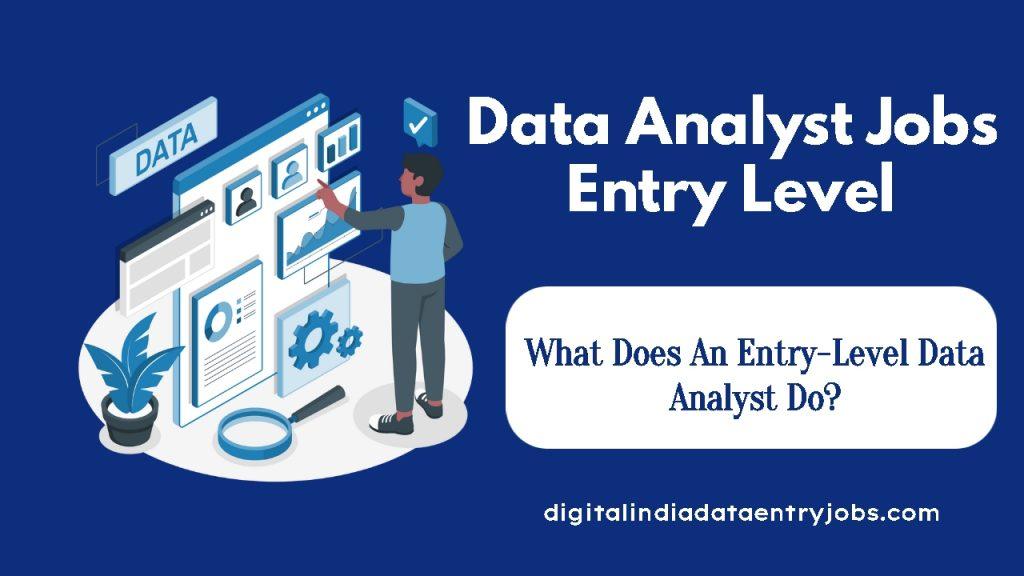Data Analyst Jobs Entry Level:- Many people are retraining for careers in the twenty-first century, and data analytics is one of the most sought-after industries. This might be the result of a desire to try something different or the impact of the epidemic on job losses. In the second half of 2021, 81% of US data science and analytics teams plan to increase their analyst count, per a poll conducted by executive recruitment agency Burtch Works. It is a global trend.
You may be thinking that this will greatly boost your chances of changing careers, but let me first explain what data analytics is. Or perhaps you would like to know what a data analyst at the beginning level does. We’ll address all of these important queries in one article, along with several others:
Contents
What is data analytics?
To put it succinctly, data analytics is the process of examining unprocessed data to generate insightful, useful information. Since data is present everywhere, this is feasible! Data is generated each time a user clicks on a link, makes an online purchase, posts a photo to Instagram, or places an Uber order. Businesses gather this information in enormous stores known as data warehouses. Businesses can greatly increase their competitive edge by using these data to analyze and gain predictive power.
With data analytics insights, such as what customers purchase, how they travel, and what health difficulties they encounter, organizations can plan and make well-informed decisions about how to move their initiatives ahead much more effectively. The predictive ability of data analytics, along with the massive volumes of data that we currently generate on a daily basis, is what drives the current demand for this position. And that’s a summary of data analytics!

Also Read:- Data Entry Jobs, Digitizeindiagov, Onlinereferjobs
What does an entry-level data analyst do?
Finding the mysteries concealed in large data is the overarching objective that unites all data analysts. But if you look closer, you’ll notice that the position has a wide range of responsibilities. Senior-level supervision is required for junior data analysts to complete business-critical tasks. Although the position tends to grow increasingly specialized over time, there are broad categories of work that junior data analysts can perform.
A larger data analytics or data science team typically includes entry-level data analysts. Typically, their job entails doing tasks that, when combined, are essential to the larger data analytics process. Though these activities alone may not be high-stakes, they do provide novice analysts with a safe environment in which to develop and refine their skills and make quick corrections if necessary.
Typical duties for an entry-level data analyst include:
- Gathering information: Typically from “safe,” or pre-selected, sources, then putting it in an already-built database, warehouse, or data storage system.
- Cleaning data: You’ll be in charge of performing duties like de-duping, standardization, and reporting missing information as part of the data collecting and storage process.
- Report writing: Using programs like Microsoft Excel or Power BI, you’ll undoubtedly need to perform basic data analysis and write up written summaries of your findings.
- Developing dashboards: To provide non-technical staff with oversight of company data sources, you may be asked to assist in the development of dashboards and visualizations.
- Databases: You will gain knowledge on how to use internal data storage systems, including ERP and CRM programs.
- Enhancing your broader abilities: From pattern detection to problem-solving, entry-level data analysts need to master the abilities that more experienced analysts take for granted.
- Weekly check-ins: As a new member of the team, you’ll probably have to explain your progress to a more experienced team member at these check-ins.
These general duties provide you an idea of what to expect in your first few weeks or months in a junior data analytics career, while the specific duties may differ.
What distinguishes a senior data analyst from an entry-level or junior data analyst?
As demonstrated, junior data analysts and entry-level data analysts perform significant but non-essential duties. Typically, more experienced colleagues supervise their work and bear the majority of the accountability for the more difficult assignments.
A senior-level data analyst, also known as a principal analyst or lead data analyst, needs more advanced capabilities than an entry-level analyst, which is generally defined as a graduate with up to three years of experience in the field.
Typical characteristics that set a senior analyst apart are:
- Education: A bachelor’s degree is frequently required for entry-level analyst positions, while a master’s or even doctorate in a subject like statistics or computer science is more typical for senior data analysts.
- Programming abilities: Most senior analysts should be able to use languages like Python or R at a high degree of competence.
- SQL: Senior analysts typically use more complex code than entry-level analysts and are capable of creating things like automated reports and temp tables.
- Analytics abilities: Senior analysts will typically use far more complex data models and do analyses at a much higher level than rookie analysts.
- Management: Senior analysts work considerably more directly on projects, employing people, and setting up procedures.
- Mentoring: Senior data analysts will be required to supervise and mentor the work of their less experienced colleagues, except at times when they work alone.
- Expertise in the subject: Senior analysts serve as the organization’s go-to data specialists for team members, heads of departments, and senior management. They should anticipate receiving a tonne of inquiries!
- Advocacy: Senior analysts frequently have to convince senior stakeholders who control the purse strings of the advantages of data analytics and new technology to support business choices.
- Duration of the role: The acquisition of all this additional knowledge takes time. Although some driven analysts may advance swiftly, a senior data analyst position often takes five years or more to fill.
Although you won’t be responsible for these tasks as an entry-level data analyst, you can nonetheless draw inspiration from them. Aim high; you never know where it will lead.
Salary: Data Analyst Jobs Entry Level
Data analytics is a diverse field that may be exciting, demanding, and labor-intensive at times. But part of the fun of the job is that no two days are ever the same, and you may have a fulfilling career. But let’s be honest: we all have expenses to cover. This takes us to our next query: what is the average salary for a beginning data analyst?
Although there isn’t a perfect solution, we can create a good estimate. The following websites that compare salaries demonstrate how much a beginning data analyst may expect to make:
- Glassdoor: $27,000
- SimplyHired: $30,000
- Payscale: $41,000
- Salary.com: $48,000
- Indeed: $61,000
- Salary Expert: $68,000
To give you a general idea, the average of these compensation projections indicates that junior data analysts in the United States should make approximately $46,000 a year. Not so awful, is it? Data analytics pays fairly well, but it’s usually safer to assume that this is a salary you can generally aspire for during your first two or three years, rather than a baseline on your first day.
For a sense of what you can make as you advance into mid- and senior-level data analyst employment, make sure to check out this data analyst salary guide.

Also Read:- Online Data Entry Jobs, Companycontactdetail, Uidaionlineaadharcard
Landing your first entry-level data analyst job
We’ll go over all you need to know in this section to locate and get your first data analytics job. First, a straightforward query:
What types of careers are available for Data Analyst Jobs Entry Level?
Online job advertisements may identify “entry-level data analysts” or “junior data analysts” as the only positions available, although this isn’t always the case. The work duties (described in Section 3) and the number of years of experience the employer anticipates from you will, most of the time, indicate the level of experience needed. Generally speaking, any position that requests up to three years of experience is considered entry-level.
The fact that job names change according to the type of labor performed further complicates issues. The following are some examples of entry-level data job titles you may encounter:
- Marketing analyst
- Customer analyst
- Healthcare analyst
- Clinical data analyst
- Processing analyst
- Data privacy and compliance analyst
- Operations Analyst
- Business intelligence analyst
- Sports analyst
- Financial reporting analyst
- Risk analyst
This list gives you an idea of the breadth of the data analyst job market, even if these are just a few of the titles you might come across.
What industries can junior Data Analyst Jobs Entry Level work in?
It should come as no surprise that the sciences were the main industries using data analytics before the internet’s development. Science depends so heavily on empirical data. However, a growing number of sectors are now embracing the scientific method since data is now essentially available to anybody who requests it. Some of the industries that have the highest need for qualified data analysts are the following ones:
- Finance
- Accounting and Insurance
- Healthcare
- Education
- Advertising and marketing
- Travel and tourism
- Media and entertainment
- Transport and logistics
- Retail and e-commerce
- The sciences
Many industries have specific skill needs that are best learned on the job. If you’re switching from another career, though, your experience in that industry can come in handy if you decide to pursue data analytics in the same subject.

Also Read:- Remote Data Entry Jobs, scholarships gov, Mobilenumbertrackeronline
Qualification
When applying for your first data analytics job, you’ll need to do a few practical things in addition to the skills listed in Section 1 to make an impression on the hiring manager. These tasks are as follows:
An accreditation verifying your abilities: It’s useful to know your Python from your SQL and your qualitative from your quantitative data, but you’ll also probably need to demonstrate your proficiency with each, which normally calls for certification or accreditation in data analytics. Thankfully, there are lots of reasonably priced short courses that can help you expand your skill set and earn the crucial certification that businesses require. Just make sure to research which courses employers will accept before investing large sums of money!
An excellent portfolio of data analytics: Even though you won’t have much experience yet, you can still demonstrate your enthusiasm for the subject by building a simple portfolio with a few side projects. Over time, you can progressively enlarge it. most expensive online courses culminate in a sample project— why not start by including that?
A strong cover letter and resume: You’ll need both a strong cover letter and resume for data analysis jobs. Employers won’t be expecting these to demonstrate a tonne of experience as an entry-level data analyst, but they should be concise, well-written, and formatted appropriately. Most importantly, you have to customize them for every job you apply for. There’s nothing that says drab like a basic resume.
#Saras

